Table of Contents
General Douglas MacArthur spent his entire life in the United States Army, from birth to death. He was a five-star US army commander who was clever, contentious, egotistical, courageous, imperiled, and very bright.
MacArthur’s military career began in 1903, when he graduated with honors from the United States Military Academy at West Point. He was devoted to his country and duty and had exceptional command skills. He was deployed as an Aid-in-Camp to Theodore Roosevelt’s White House as a subordinate officer, and eventually became the first public relations officer in the United States army. MacArthur’s military career encompassed key command posts in both World Wars; the liberation of the Philippines; the Korean War; and his most significant contribution to history as the Supreme Commander of the Allied Powers in Japan.
Many of the engagements he fought resulted in spectacular triumphs. During both war and peace, he exhibited exceptional leadership qualities. There are numerous lessons to be learned from his life and the comments he made while serving as a public spokesman and advising government authorities. In American military history, he was the most famous general.
EARLY YEARS
Douglas MacArthur was born on January 26, 1880, in Little Rock, Arkansas, to Captain (later Lieutenant General) Arthur MacArthur and Mary Pinkney Hardy MacArthur of Norfolk, Virginia. Douglas was the youngest of three brothers and sisters. Arthur, the eldest, attended the United States Naval Academy and served in the Navy until his death in 1923. Malcolm, his other brother, died as a kid in 1883 and is buried in Norfolk.
He grew up in the isolated areas of New Mexico, where his father, Arthur MacArthur, led an infantry company tasked with safeguarding farmers and railroad employees from the Indian “threat.” He was awarded the congressional medal of honor for conducting a daring attack on Tennessee’s Missionary Ridge. Douglas began riding and shooting before he could read or write. He enrolled in the West Texas Military Academy in San Antonio in 1893. Douglas was appointed to the United States Military Academy in 1898 as a result of his exceptional performance there, his family’s political ties, and top grades on the qualifying exam. He has a chance to set one of the best records in academy history over the next four years. In 1903, he obtained his commission after graduating first in his class.
Life in Marriage
In his life, he was married twice. MacArthur was married to and divorced from Louise Cromwell Brooks in the 1920s. In April 1937, the General married Jean Faircloth, a Tennessee native. Douglas and Jean MacArthur’s only child, Arthur MacArthur IV, was born in Manila on February 21, 1938. Her love would be a source of inspiration for the rest of his life. Following the birth of their son, the 58-year-old general proved to be an excellent parent.
JOINING THE ARMY
MacArthur began his military career in 1899 when he was accepted into the United States Military Academy at West Point. On June 11, 1903, Douglas MacArthur was given a commission as a Second Lieutenant in the Corps of Engineers. This was after an exciting and profitable time at West Point, where he graduated first in his class and was the highest-ranking cadet.
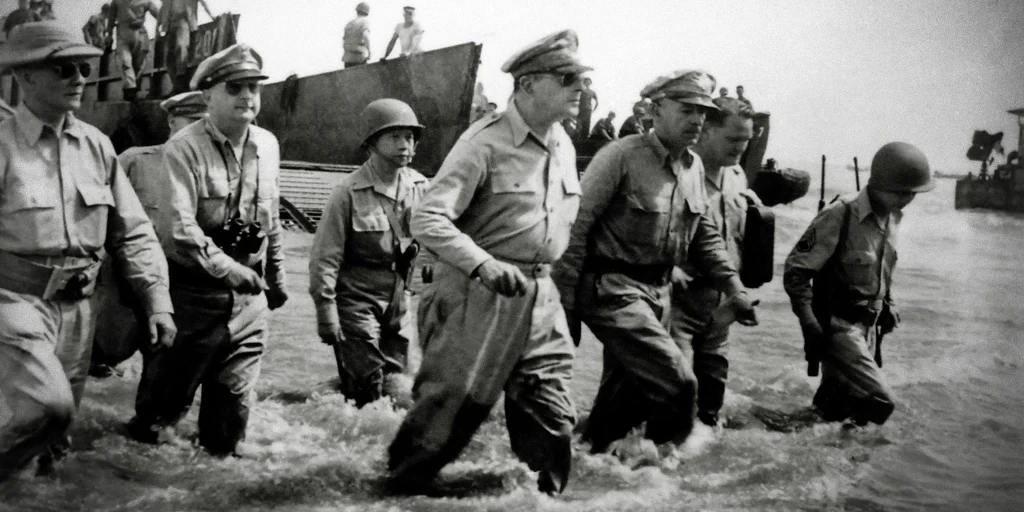
His first duty assignment was to the Philippines, where his father had recently served as military governor. Douglas’ first encounter with military combat came from Filipino insurgents.
Douglas MacArthur worked as an Army engineer in the United States and abroad until 1914. The year he spent as an aide to his father on a lengthy tour of the Far East, visiting Japan and recent battlegrounds of the Russo-Japanese War (1905–1906), was the only exception. Douglas was a key figure in the military invasion of Vera Cruz, Mexico, in 1914. MacArthur went back to Washington, where he worked on the General Staff until 1917, when he joined the 42nd Infantry Division, which had just been formed.
MacArthur is credited with dubbing the 42nd Division the “Rainbow Division” because it was made up of National Guard forces from all throughout the United States. He was the divisional chief of staff, the commander of the 84th Infantry Brigade, and the division commander for a short time. His service with the division in France and Germany earned him two Distinguished Service Crosses, a Distinguished Service Medal, and six Silver Stars. He also got two wound stripes, which were later recognized with Purple Heart medals and a promotion to Brigadier General, his first “star” in the National Army.
Douglas MacArthur became Superintendent of the United States Military Academy at West Point after his return to the United States in 1919. He served two tours of duty in the Philippines and in numerous locales around the United States from 1922 to 1930. He led the United States Olympic Team to Amsterdam in 1928.
President Herbert Hoover named Douglas MacArthur Chief of Staff of the United States Army in 1930. President Franklin D. Roosevelt kept him in this position until the fall of 1935, when he returned to the Philippines to serve as military counselor to the newly formed Philippine Armed Forces.
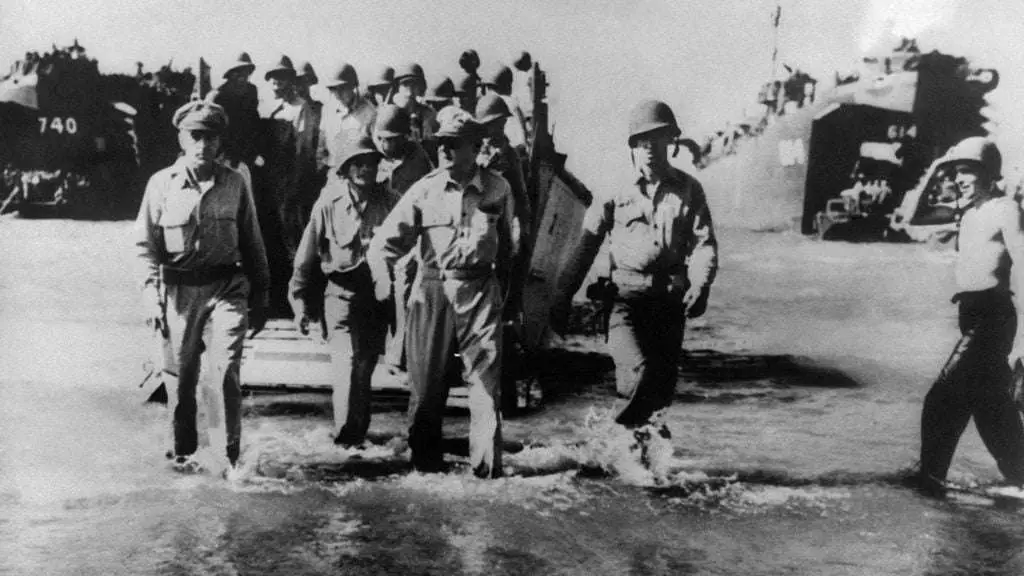
Commonwealth The main job for MacArthur was to organize and train the Philippine Army. Even though he left the U.S. Army at the end of 1937, General MacArthur stayed on as the military advisor for the Philippine Commonwealth and was named Field Marshall of its army.
The US Army Forces, Far East, were formed in response to the spread of the war in Europe and the increasing Japanese expansion in the Far East. General Douglas MacArthur was summoned to active service by President Roosevelt to lead these forces. The Philippine army will also be called upon to assist US forces, according to the President. Until December 8, 1941, the General was concerned with mobilization, planning, organizing, training, re-equipment, and supplying his command. Despite having been significantly strengthened prior to the commencement of the war, particularly in terms of air power, the US-Philippine forces were no match for the Japanese combined naval-air-ground attack. General MacArthur led the Americans and Filipinos as they retreated to the Bataan peninsula and the fortress islands blocking Manila Bay, most notably Corregidor Island. This stopped the Japanese from moving forward.
Because no large reinforcements could reach Bataan and Corregidor, and because the plague had decimated the Philippines and the United States, President Roosevelt ordered General MacArthur to abandon the Philippines and proceed to the United States.
travel to Australia. In a torpedo boat, the General, his family, and a nucleus of staff left Corrigidor for Mindanao, from where they traveled to Australia. Some eighty years after his father received the honor on Missionary Ridge in Chattanooga, General Douglas MacArthur was given the Congressional Medal of Honor for his tenacious and valiant defense of the Philippines.
From April 1942 to October 1944, General MacArthur prepared, organized, planned, and led his Southwest Pacific Command through New Guinea, New Britain, the Bismarck Islands, and Morotai to an extraordinarily successful landing at Leyte, central Philippines. The General arrived with his soldiers at Lingayen Gulf in January 1945 and marched on Manila and Bataan.
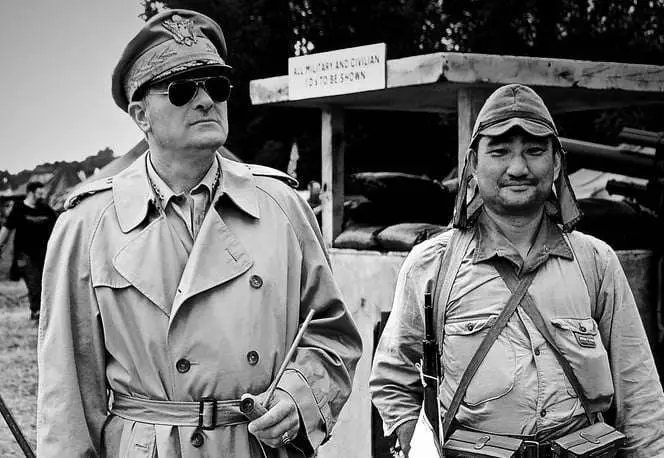
General MacArthur assumed his authority as Supreme Commander for the Allied Powers on September 2, 1945, after the Japanese surrendered on the USS Missouri (SCAP). Unlike previous occupation leaders, General MacArthur treated the Japanese with kindness. He directly managed Japan’s reconstruction and democratization. A significant priority was to reach an early and equitable peace deal with Japan. In a few months, a new constitution, which was a major departure from Japan’s pre-war constitution, was drafted. In early 1946, new laws resulted in the first universal suffrage election. Land reforms continue to have an impact today. Trade and production were encouraged. Reforms in education and municipal government were impacted. The right to create and join trade unions, as well as the freedom of the press, were recognized.
With the invasion of the Republic of Korea by North Korea in June 1950, General MacArthur was ordered to help the South Koreans with his resources, including ground soldiers. In July, MacArthur was named Commander-in-Chief of the United Nations Command, directing the naval, aviation, and land forces of the United States, South Korea, and the United Nations in preventing and repelling the Communist invaders. The General personally led the US Forces in a daring amphibious strike on Inchon on September 15, 1950. After this attack on North Korea’s back, the Communist fortifications in South Korea were no longer a threat to the UN forces. They were able to move quickly into North Korea and to the border with Manchuria.
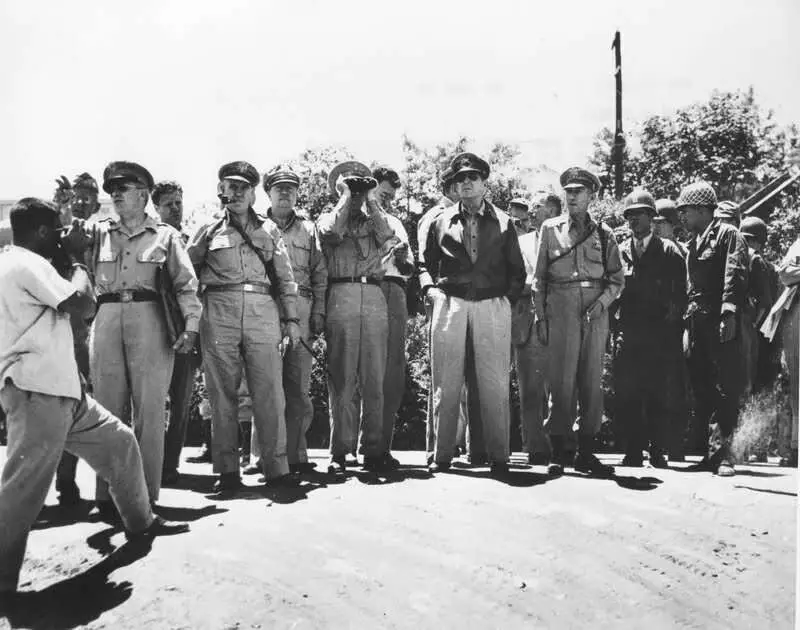
Despite the fact that some Chinese Communists were discovered in North Korea as early as late October, massed Chinese “volunteers” did not officially intervene in the Korean War until late November. MacArthur kept control of the sea and air, but the UN was powerless to stop the huge Chinese ground forces. A pullback began, with all of North Korea and a portion of the Republic of Korea being given up. By late March 1951, UN troops had crossed the 38th parallel north of Seoul, the capital of South Korea. Macarthur’s months of public and private wrangling with Truman’s government came to an end soon after. The president dismissed General MacArthur on April 11, 1951, igniting a firestorm of criticism of the plan, not just in Korea but across the Cold War. As the last great World War II commander to return home,
MacArthur was greeted as a hero when he returned to the United States. He gave a renowned speech before a joint session of Congress in which he articulated his thoughts on world events. Despite the fact that the general never had another military command, he stayed in the public eye until his death. After his Congressional address, he went on a tour of the United States, testified before a congressional committee, and delivered the keynote address at the Republican National Convention in 1952. He was appointed Chairman of Remington Rand’s Board of Directors (later Sperry Rand). He paid a touching visit to the Philippines. He gave his final commencement address to the West Point cadets in 1962. He authored and published his “Reminiscences” between 1962 and 1964.
Leadership Qualities
From the start of his military career, General Douglas MacArthur had demonstrated his aptitude and leadership characteristics. He was able to act well in the battles he fought because he had had enough experience and learned enough.
Will Power
General MacArthur was invited back to Manila in 1935 to lead a United States military mission tasked with preparing the country for complete independence in 1946. But the mounting threat posed by an expansionist Japan began to cast a pall on his idyllic life in Manila. The Philippines was doomed when war broke out with the bombing of Pearl Harbor on December 7, 1941. Macarthur’s army had withdrawn to the Bataan peninsula. But, knowing he couldn’t allow America’s most famous general to fall to the enemy, President Roosevelt ordered him to withdraw to Australia. The world watched for the following three years as his personal ambition, “I shall return,” became increasingly associated with the Pacific War. In October 1944, MacArthur gained traction and liberated the Philippines on September 2, 1945. Macarthur’s military career appeared to be doomed. But he had willpower, and in the next five and a half years as Supreme Commander of the Allied Powers in Japan, he made his greatest contribution to history.
Courage
In his life, General MacArthur had the courage to stand up to anyone. Douglas MacArthur’s first true measure of prominence came from the First World War. He was promoted to Brigadier General rapidly. He was the commander of the rainbow division, which he had helped form from National Guard soldiers before the conflict. Through the middle of the combat in France, with a flashy romantic style matched only by true battle-field bravery.
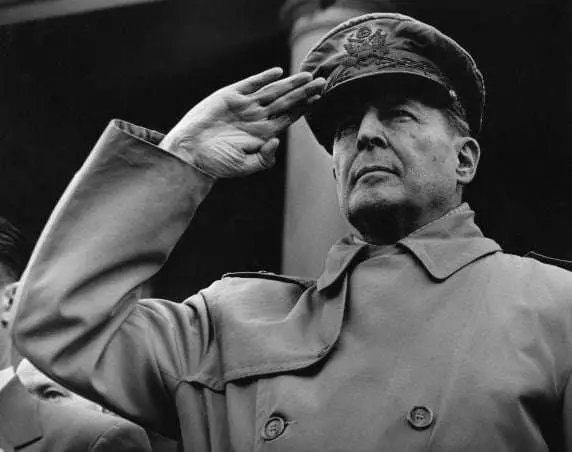
Even though it appeared that his great career would be done by the late 1940s, when the Korean War broke out in June 1950, this brave General was thrust into the spotlight. He was given command of a United Nations army led by the United States. He had the bravery to control Japan after the war, defying the line of command, and began writing letters to the US about what the US should do in Korea. He wrote to foreign combat veterans, claiming that Formosa would be an ideal location to launch an offensive battle against China. Despite the fact that President Harry Truman of the United States of America was opposed to the problem, MacArthur had the fortitude to go against the administration and the American constitution.
Knowledge
It was difficult to locate another general with General MacArthur’s level of expertise. He may obtain one of the best academic records in history by virtue of his outstanding performance at West Texas Military Academy and his success on the qualifying exam for admission to the United States Military Academy at West Point. He graduated first in the 1903 class. Later, he obtained another degree from the Engineer School of Application in Washington, DC. In 1919, he was named superintendent of the United States Military College, and he followed through on his promise to bring the academy into the twentieth century, allowing it to produce officers capable of leading the country in modern wars. Before he left the military, he got 22 degrees from universities in different countries.
Texas Jack: America’s First Cowboy Star
Ena Palmer consoled herself by teaching Doctor Carver how to shoot as she read… Read More >>
CONCLUSION
He lived in New York City for the last 12 years of his life, speaking out on public issues and advising political authorities. General Douglas MacArthur died on April 14, 1964, at the age of 84, at Walter Reed Army Hospital before being laid to rest in Norfolk, Virginia. General Douglas MacArthur’s remains were laid to rest in New York City and the Capitol Rotunda in Washington, as a grateful nation paid its respects.
In honor of his contribution to the country and the millions of Americans who served in the military from the Civil War to the Korean War, the United States has constructed a memorial hall in Virginia called “The MacArthur Memorial.”
He was far from bland, passive, or boring. His patriotism, courage, and importance as a main character of the 20th century can’t be argued with.
Source :

